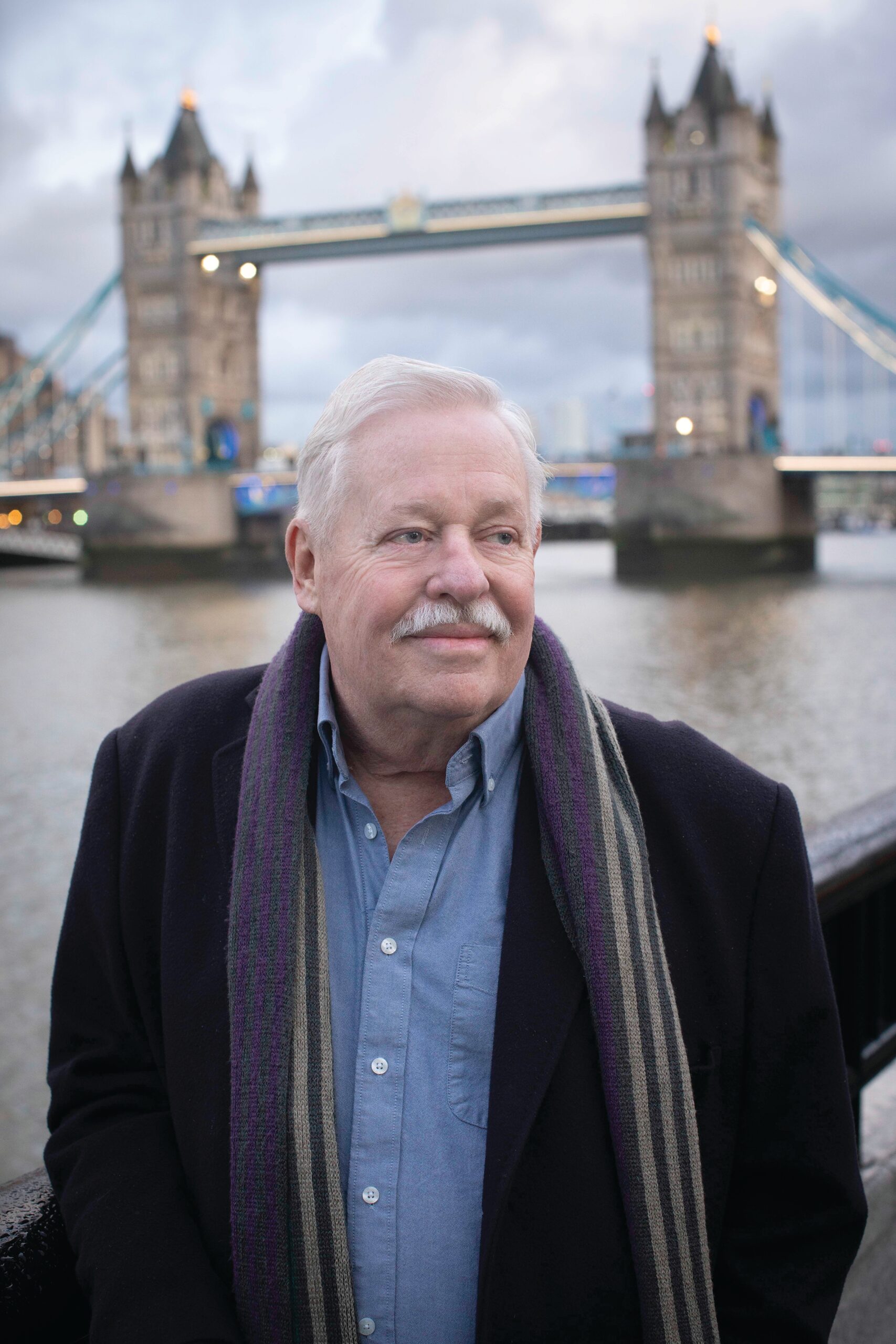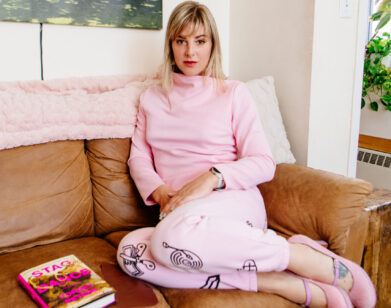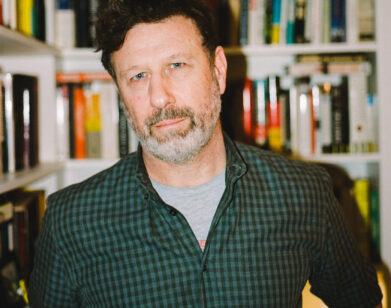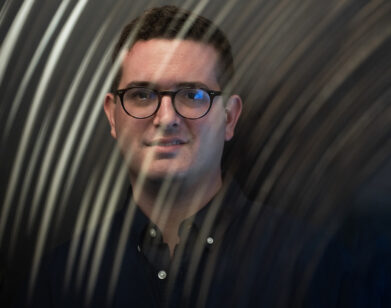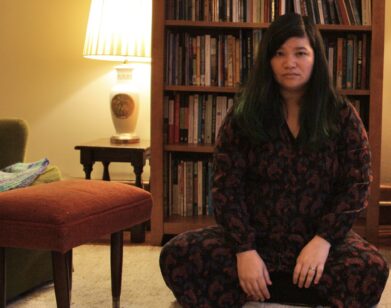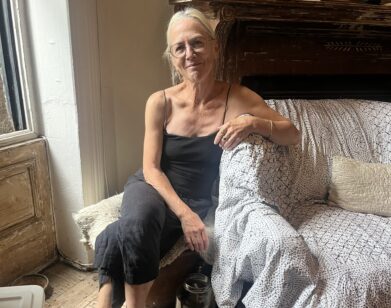ICON
Armistead Maupin Still Remembers Doing Poppers With Rock Hudson
In the mid-’70s, when Armistead Maupin first went to bed with Rock Hudson, the ‘50s heartthrob had a surprise up his sleeve. He pulled out “the cutest little poppers case you’ve ever seen,” says Maupin, chatting on a recent afternoon in his cozy south London home. “That partially was one of the things that intimidated me.”
It’s hard to imagine that the masc-est muscle bro wouldn’t swoon like Jane Wyman in All That Heaven Allows at the sight of Rock Hudson proffering a hit of amyl. But the encounter threw some other generational differences into sharp relief, too. Like his preferred pleasure enhancer, engraved with the initials “RH,” Hudson’s sexuality was kept out of sight from public view. Maupin, meanwhile, made a point to be as open about it as possible, to the extent that he outed Hudson in later years. Maupin’s Tales of The City books, first serialized in the Pacific Sun in 1974, are endlessly pleasurable evocations of post-gay lib life in San Francisco focusing on a beloved cast of characters who reside at 28 Barbary Lane, a shingled house resembling “an old bear with bits of foliage caught in its fur.” New residents are welcomed by landlady Anna Madrigal, the trans matriarch played by Olympia Dukakis in the series’ ‘90s PBS adaptation, with a joint taped to their door.
Maupin’s daffy yet heartfelt writing was a lighter counterpoint to the grittier explorations of gay life from his east coast peers in the ‘70s, like Andrew Holleran and Larry Kramer. And there’s a sense that his work hasn’t quite been given its critical flowers, even as his rosy world would likely be received today as a poignant exploration of queer domesticity. His aim has always been simple: “I just want to be able to entertain,” he told me, as his lush labradoodle flops down on the couch. “That was the goal with Mona [of the Manor], to do something that makes people rub their hands together with glee.” His new book is a riot, centering on the snarky, big-hearted Mona Ramsey, who opens up her dilapidated country seat to anglophile yanks to raise cash. With some wicked slapstick, bats in the belfry, and the return of some much-loved Maupin characters, the tenth Tales installment is a joyful reminder of Maupin’s wit and craftiness.
He still has more stories to tell. Ahead of the book’s release, we got together to discuss leaving San Francisco for south London, hanky code mishaps, and his run of interviews in the 1980s with showbiz greats for this very magazine.
———
OWEN MYERS: I’m curious about you and Joan [Rivers] in the ’80s.
ARMISTEAD MAUPIN: Yeah, all of them were in the ’80s. Joan, Bette Midler, Clay Felker.
MYERS: You started off as a journalist, correct?
MAUPIN: Yes. It was after I had written Tales of the City.
MYERS: Do you have memories of doing the Joan Rivers piece?
MAUPIN: How friendly she was. She invited me and a friend to come to her show and she introduced me to Mr. Phyllis. That was her joke about her hairdresser who was called Mr. Phyllis. He turned out to be really hot.
MYERS: Oh, yeah?
MAUPIN: And, oh god, there’s more than you want to know. We hopped in the sack together. He was upset with me because I didn’t want to do what he wanted to do, because he thought I had a red hanky in my back pocket.
MYERS: Well, which pocket?
MAUPIN: Good question. Well, it must have been that one because it was really my wallet, so it must’ve been mistaken for a blue hanky.
MYERS: I see. So, it was slightly lost in translation.
MAUPIN: It was totally lost in translation, as was that whole encounter.
MYERS: Joan was really just becoming a star at that point, right? She was on the way up.
MAUPIN: She’d been there quite a while. She had her show and everything else. I loved her, she was really great.
MYERS: What about Bette Midler?
MAUPIN: Bette was freaking out because she’d just come off the set of Jinxed!, which was the worst experience of her life. The men on the set, and there were plenty of them, gave her a hard time. Her leading man said it was easier for him to kiss his dog than it was to kiss her.
MYERS: Jesus.
MAUPIN: He was a really nasty shit so I had to kind of talk her down from the ledge. I was proud of myself, I made her feel at ease.
MYERS: Let’s talk about the new book, which I really loved.
MAUPIN: Oh, good. You read it?
MYERS: I devoured it. It was wonderful to see you exploring that part of the Cotswolds and it reminded me of some of the classic English comedies of manners.
MAUPIN: That’s kind of what you’re meant to think. I’m so glad that it rang true for you.
MYERS: In college, I read a lot of Forster and things like that, so that definitely struck a chord, but with a twist. How did the book start to germinate?
MAUPIN: It started because I had loved reading a book called I Capture the Castle by Dodie Smith. It’s a bunch of eccentrics living in a grand house that’s falling apart.
MYERS: Yeah, it rings a bell.
MAUPIN: And I’d always loved that book and I set out to write something like that. It’s quite different in a lot of ways, but that was the initial inspiration. And I knew about Stanway House because I’d been there.
MYERS: I see! That’s in the Cotswolds. Beautiful.
MAUPIN: The very eccentric Earl who lives there, he was a Lord when I met him, but he invited us back this year and it was just as charming as I remembered it being 40 years ago. He loved anybody that loved the house, and I certainly loved the house. That was the germination of it, all those things. I wanted to do Mona [Ramsey, of Tales of the City] again because I had kind of famously ignored her and people remarked on it.
MYERS: Yeah, there was a bit of a want.
MAUPIN: There’s a reason to go back, yeah.
MYERS: What you do within that house and with the different people is so much fun. Why set it in the early ’90s?
MAUPIN: Well, that’s kind of the time I wanted to cover, this was a chunk missing in Tales. In The Days of Anna Madrigal, I did a flashback. This allowed me to talk about the worst days of AIDS too, which I had also sort of avoided in a way.
MYERS: Some of the most striking scenes are actually between Mona and Wilfred. I think there’s a whole chapter which is about a mother’s natural protective instinct of her son. What is really striking is your ability to thread the needle between a young man’s desires, and then this kind of context and balancing the two.
MAUPIN: I didn’t want to deny it to him because I didn’t deny it to myself when I was that age. I had him sort of playing by the rules, going to safe-sex areas and things, but I didn’t want to deprive him of any fun.
MYERS: Absolutely.
MAUPIN: And I’ve received reviews of the book that say it’s great how sex-positive it is.
MYERS: Well, yes. I used to go cruising on Hampstead Heath when I was slightly younger, and I don’t think I’ve ever read about it in this way that seemed like someone had actually been there.
MAUPIN: I hadn’t, but—
MYERS: Oh, you hadn’t?
MAUPIN: No. I did some online reading to find out where the fuck tree is.
MYERS: I remember the first time I went, I used the family computer to print out this message board thread ’cause I’d heard so much about the “fuck tree” and I was just desperate to find it. I was under the street lamps, trying to read these printed out instructions. It makes me laugh to think about it.
MAUPIN: That’s wonderful.
MYERS: Why was it important for you to kind of preserve that IRL cruising?
MAUPIN: I don’t know if it’s subsided, I’m told that things get very busy in Hampstead and on Clapham Common. The appeal was to go back to a time before the internet when people didn’t have Grindr. I liked the idea of it being an adventure. When I realized I could do that for straight folks, too… What the fuck is it called, when they sit in their car?
MYERS: Dogging. That’s straight cruising.
MAUPIN: Yeah, I could relate to it because of gay cruising. It’s a little bit odd, fogging up the windows for the benefit of the people outside, that’s very English too.
MYERS: It’s a happy medium.
MAUPIN: Yeah.
MYERS: It was interesting to see Jesse Helms’ name crop up.
MAUPIN: I didn’t want to let him go.
MYERS: We’re experiencing the rise of a fascist streak in the U.S. that never went away. Why was it important for you to revisit that now?
MAUPIN: Because I hadn’t quite gotten it out of my own system. I wanted it to be a thorn in the side of everybody back in North Carolina.
MYERS: Is he remembered fondly?
MAUPIN: No. Since living here, I have come to hate so many things about America.
MYERS: Really?
MAUPIN: I hate to admit it, but it’s just shocking that there’s such barbarism. People misbehave horribly and I’m really done with it. I want to lead a quiet, gentle life so I toddle off into the future. I watch things on television mostly about what’s happening with this new fascist movement and there’s no mistaking it. I am just horrified that we’ve allowed it to get to this point.
MYERS: How long have you lived here now?
MAUPIN: Five years.
MYERS: What was the spark that made you move?
MAUPIN: Well, Chris [Turner, Maupin’s husband] and I both wanted to have a change. We’d really done San Francisco, I’d lived there for 40 years and he for 25 and we liked the idea of a new adventure. We used that and fascism in America to spur us on. I feel a certain relief living here. California was an escape from America when I moved there 40 years ago, and it’s not quite there anymore.
MYERS: Well, San Francisco has been gutted.
MAUPIN: It’s been gutted. I have dear friends up in Bolinas and Inverness that have a wonderful life there, but anything that’s around the tech invasion is ruined.
MYERS: Yeah, it decimates individuality for chrome and glass.
MAUPIN: People have a manufactured bohemianism where they spend a lot of money to go to Burning Man and then go right back to the office.
MYERS: Yeah, absolutely. When did you last go back?
MAUPIN: Chris is going to go back in a couple of weeks to recover what is laughably referred to as “my papers.” It’s all in the storage space in Santa Fe.
MYERS: How far do the papers go back?
MAUPIN: I imagine the early ’70s.
MYERS: That era of San Francisco in the ’70s, when you were writing the serialized Tales of the City [for the The San Francisco Chronicle], is slightly mythologized as a period of time. It was pre-AIDS, it was post-gay lib.
MAUPIN: It was wonderful. We didn’t know how wonderful it was until AIDS came along, but it was a glorious time to be young and gay.
MYERS: You were a local celebrity presumably, because of your column. You would get recognized in the bars. Fans introduced themselves to you.
MAUPIN: They did.
MYERS: How did you nurture your creative spark?
MAUPIN: By taking it a day at a time. I really didn’t know it was going to last as long as it did. But in the beginning, I simply had to write 800 words a day to keep the column going in the paper.
MYERS: Like blogging.
MAUPIN: Yes, it’s exactly like blogging. I’ve seen it described as weekly in several places and I always cringe when I see that, because it was five days a week.
MYERS: I heard that you sometimes clashed with your editor.
MAUPIN: Only in a joking way. Usually, I was giving her a hard time about the fact that I was late, very slow in cranking it out. But I would come back and tell stories of Rock Hudson or adventures I’d had the night before to the women in the People department and they’d pretend to be horrified.
MYERS: How did you meet Rock Hudson?
MAUPIN: It was a long roundabout thing, it’s in my memoir. But a friend of mine invited me to Palm Springs to some event that he said Rock Hudson was going to be present at. I ended up going home with a bunch of guys from the party who took me out to some house in the middle of the desert where we took some drug called TT1, which I’m told was a relaxant given to women in childbirth. It certainly relaxed me. It was the perfect place to do it, frankly.
MYERS: If you’re going to trip, trip out there.
MAUPIN: I did, it lasted for several days, actually. I met this lovely guy who turned out to have been a former boyfriend of Rock’s. He invited me the next time they were going to see Rock in at the San Bernardino Playhouse. It was awful. And Rock was part of why it was awful. It was just not right for him. I remember he had to die on stage and when his body hit the ground it was like thunder, like timber falling. We went backstage afterwards to see him. The moment I had my hand in his, the lights went out.
MYERS: No way.
MAUPIN: Just a blackout. I said, “Well, this is the opportunity of a lifetime.” We got together on various occasions.
MYERS: I mean, he was so hot.
MAUPIN: He was so hot.
MYERS: I saw the documentary you were in last year, because that’s how I found out about your acquaintance with him. In the ‘70s he seemed very free, and still slightly secretive to an extent.
MAUPIN: He was, to a certain degree. There was enormous pressure on him to keep quiet. The second day I met him in San Francisco I said, “I’d like to write your story. I’m the perfect guy to do it.” But his partner at the time, Tom Clark, said, “Not until my mother dies,” which I thought was just absurd. If I was fucking Rock Hudson, I would tell my mother first thing.
MYERS: How was it in the sack?
MAUPIN: Well, it was not great but that was my fault.
MYERS: Why?
MAUPIN: It was massively intimidating. He said, very touchingly at one point, “You know I’m just another guy like you,” which is all he wanted. I said, “No, you’re not, and I’m Doris Day,” and he got it. But yeah, it was extremely intimidating.
MYERS: I heard he was into his poppers.
MAUPIN: He had the cutest little poppers case you’ve ever seen. A little leather case that said “RH” on it. That partially was one of the things that intimidated me. I’m killing myself that I didn’t buy it from his estate.
MYERS: Yeah. It’s a really interesting period of history, especially with his tragic demise. You spoke about his sexuality in the press around the time he became public about being [HIV-]positive.
MAUPIN: Yeah, I did. I knew it was my responsibility to do that. But the old queen that ran the flower shop in San Francisco clucked his tongue at me as I walked past. I’ve never felt it was a betrayal of an old friend. We were at a point in history where this had to be done. Somebody had to say he was a gay guy and the whole of Hollywood knew he was gay. And he has nothing to be ashamed of, so that’s what I did.
MYERS: Did he ever reach out to you after that?
MAUPIN: No. He sent his biographer to talk to me, I was shocked. He knew I’d always tell the truth, I think. And she said, “Rock said you’re the first person I should talk to.” I was probably too much of a coward to pursue that.
MYERS: To pursue what?
MAUPIN: Hooking up with him again.
MYERS: Well, it seemed like a very tumultuous time.
MAUPIN: I knew that and I thought, “This will make a difference.”
MYERS: Yeah, absolutely. Do you feel like you’re more creative in London or San Francisco? How does each affect your writing routine?
MAUPIN: Well, if it didn’t take me so damn long to write this novel, ten years. I was very pokey. Chris is great, he’s just patient with me and says, “Don’t worry about it, just do it when you do it.”
MYERS: Do you stress about it more these days?
MAUPIN: I suppose I stress about it less. I wanted the novel to be good. But I was a little bit panicky about leaving the old turf for this new one. But it’s still very Tales of the City in its own way.
MYERS: What enchants you about those British mores and customs that you depict so well in this novel?
MAUPIN: Well, I don’t know exactly. It’s quite different from America. There’s a gentility to it, and kindness, and wit is permitted. I can’t really sum it up. As you say, it’s my own invention anyway, but it’s going to come out the same way in many ways.
MYERS: Is there an overlap with so-called “southern hospitality?”
MAUPIN: No, because I know what southern manners are all about. You speak kindly of people in their presence and viciously when they’re gone.
MYERS: Yes. I do want to talk about the Tales of the City adaptation. Before it was ever a PBS show, there was some sort of movie script in development, right?
MAUPIN: I don’t know where that talk came from. Possibly me. I was trying everything.
MYERS: I interviewed an actress last week and she said, “A well-researched interviewer will come and tell me things about myself that I don’t even know.”
MAUPIN: Yeah, that’s true.
MYERS: Was Tales of a City a tough sell for you?
MAUPIN: Well, no, because Channel 4 did it first then PBS picked it up. It was a British product. I feel very lucky that it landed with them.
MYERS: What movies did you grow up loving?
MAUPIN: Anything by Alfred Hitchcock. Terrible man, wonderful movies.
MYERS: Who is your favorite Hitchcock heroine?
MAUPIN: I suppose Kim Novak.
MYERS: Have you ever been approached to do a biopic of your life?
MAUPIN: Well, there was the documentary. But no, nobody’s asked to…
MYERS: Who would you want to play you?
MAUPIN: I’d dread to think who they’d get. John Lithgow? I used to think I looked like Anthony Hopkins, and I kind of did. And now, I really do.
MYERS: I could see that. Since you moved here, how have your goals as a writer changed?
MAUPIN: It’s always the same thing, I just want to be able to entertain. That was the goal with Mona, to do something that makes people rub their hands together with glee.
MYERS: Well, thank you so much for speaking with me. It’s lovely to read Michael again.
MAUPIN: Oh, good. I feel a certain responsibility towards him. I wanted to be in his voice and he’s mourning the loss of a friend who’s me mourning the loss of my friend, Steve. So, it’s really tied up in my life.
MYERS: Does that make it hard?
MAUPIN: No, I like to celebrate those things.
MYERS: I appreciate that you show an age gap relationship in the book and explore how fun and affirming it can be. Between you and your husband, I believe there’s an age gap.
MAUPIN: Oh, yeah. 28 years!
MYERS: And you met in San Francisco, is that right?
MAUPIN: Yeah, walking down the street. But I had seen him on a website. I think nowadays we call it “Daddy Hunt” but it was something bad, like hotoldermale.com.
MYERS: That’s brilliant.
MAUPIN: But that’s what it was. My housekeeper was an extremely hung gentleman who showed me a picture and it was Chris. Then I bumped into him on the street in San Francisco and I thought, “Oh, fuck, that’s him.”
MYERS: And you said something?
MAUPIN: I said, “Didn’t I see you on a website?” It wasn’t that clever of me. He said, “I started that website.” He gave me his phone number and he didn’t expect to hear from me. And he didn’t for a week or so, because I was sick. But eventually we got together and fell into each other’s arms at my front door.
MYERS: What’s the secret?
MAUPIN: I just think when you find somebody who’s kind, that’s the biggest part, someone who is going to treat you well at every turn no matter what happens. And I like sleeping with him.

